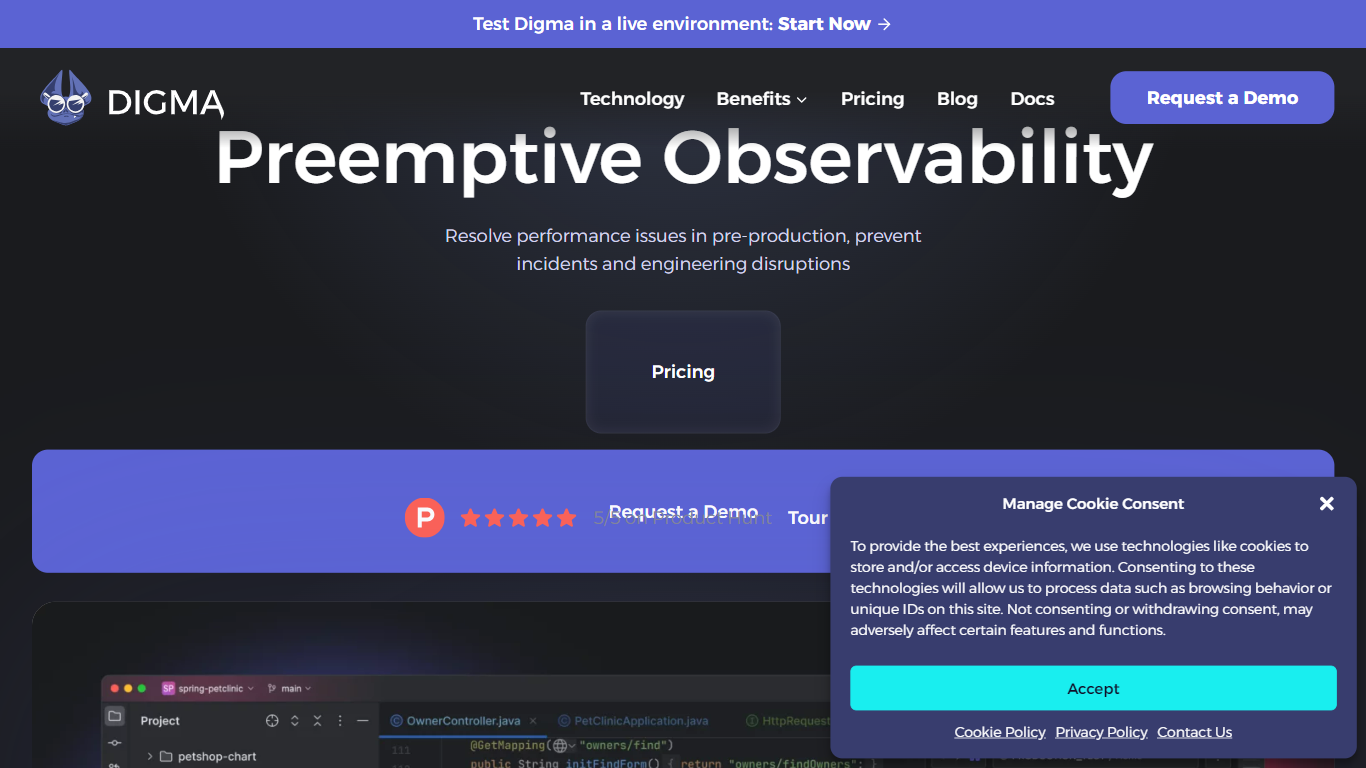
Last updated 04-20-2025
Category:
Reviews:
Join thousands of AI enthusiasts in the World of AI!
Digma
Digma Preemptive Observability is a powerful tool designed to enhance the software development lifecycle (SDLC) by identifying potential issues before they escalate into significant problems. Its core functionality revolves around Preemptive Observability Analysis (POA), which allows developers to detect performance and scalability issues during the pre-production phase. By focusing on early detection, Digma helps teams avoid costly disruptions and wasted engineering time, ensuring a smoother development process.
The target audience for Digma includes software engineers, team leads, architects, and engineering managers who are looking to improve their development workflows. Developers benefit from Digma's ability to provide insights into component usage and performance, while team leads and architects can prepare their codebases for scaling by identifying potential bottlenecks early on. This makes Digma an essential tool for any organization aiming to enhance its software development practices.
Digma's unique value proposition lies in its ability to prevent issues rather than merely alerting teams after they occur. Unlike traditional monitoring tools that focus on post-production problem detection, Digma's proactive approach allows teams to prioritize building and innovating instead of firefighting. This shift-left strategy not only saves time but also improves overall software quality and performance.
Key differentiators of Digma include its integration with OpenTelemetry, which allows it to work seamlessly with existing observability tools without requiring code changes. Additionally, Digma's AI-driven suggestions for resolving inefficient queries and code bottlenecks further enhance its value, making it a vital part of the development workflow. By highlighting affected areas and components for each code change, Digma eliminates the risk of breaking changes, thus saving valuable engineering time.
In terms of technical implementation, Digma operates without the need for complex setups or code alterations. It analyzes generated OpenTelemetry data to pinpoint issues, making it easy for developers to navigate between identified problems and the actual source code. This straightforward integration ensures that teams can quickly adopt Digma and start reaping its benefits without significant overhead.
Preemptive Observability Analysis: Digma identifies performance issues before they impact production, allowing teams to resolve problems early and maintain smooth operations.
Code Change Impact Analysis: The tool highlights affected areas for each code change, helping developers understand potential breaking changes before merging Pull Requests.
AI-Driven Fix Suggestions: Digma provides intelligent recommendations for optimizing inefficient code, which helps teams improve performance and reduce resource consumption.
Seamless Integration: Digma works with existing observability tools without requiring code changes, making it easy to implement and use in any development environment.
Scalability Insights: The tool helps teams identify which parts of their codebase will scale effectively, preventing bottlenecks and ensuring applications meet performance goals.
1) How is Digma different from traditional monitoring tools?
Digma is not an alternative to traditional monitoring tools but a complementary solution. It focuses on identifying problems earlier in the development cycle, allowing teams to prevent disruptions before they impact production.
2) Can Digma help with breaking changes in the codebase?
Yes! Digma analyzes every code change and highlights affected areas before merging, saving teams hours of debugging and firefighting.
3) Does Digma require code changes or complex setups?
No, Digma works without requiring any code changes. It is OpenTelemetry compliant, so it easily integrates with existing observability tools.
4) How does Digma help reduce infrastructure costs?
Digma identifies inefficient code patterns that increase resource consumption, helping teams write cost-efficient code that scales better and reduces infrastructure expenses.
5) Does Digma use AI, and what happens to our data?
Digma does not use public AI models that could share your data outside your organization. All data remains local, ensuring full control over observability data.
6) What kind of performance issues can Digma detect?
Digma can detect a variety of performance-related issues, including bottlenecks, scaling issues, and runtime errors that traditional tools may miss.
7) Is Digma a replacement for profilers or static analysis tools?
Not really. Digma complements these tools by analyzing real runtime data, detecting issues that static analysis tools cannot catch.
